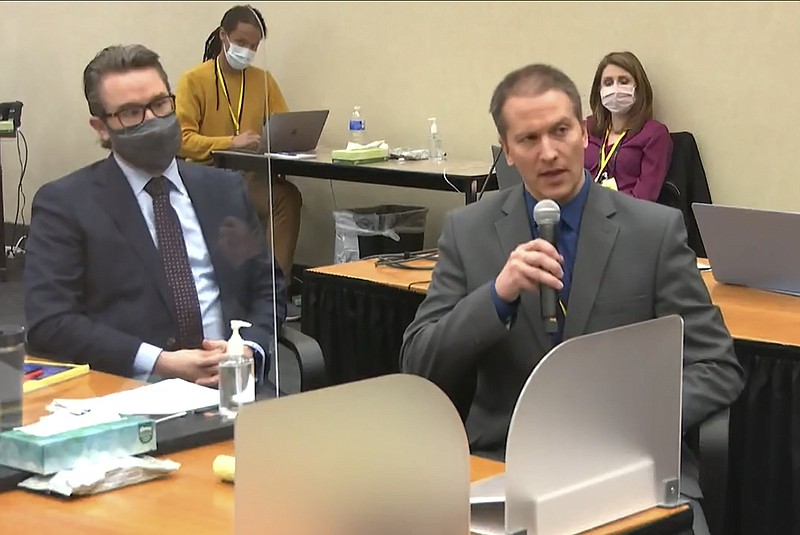MINNEAPOLIS -- Former police officer Derek Chauvin chose not to take the stand as testimony at his murder trial ended Thursday, passing up the chance to explain to the jury and the public for the first time what he was thinking when he pressed his knee against George Floyd's neck.
Closing arguments are set to begin Monday, after which a racially diverse jury will begin deliberating at a barbed-wire-ringed courthouse in a city on edge -- not just because of the Chauvin case but because of the deadly police shooting of a 20-year-old Black man in a Minneapolis suburb last weekend.
Before the jury was brought in Thursday morning, Chauvin, his covid-19 mask removed in a rare courtroom moment, ended weeks of speculation by informing the judge he would invoke his Fifth Amendment right not to testify.
Shortly afterward, the defense rested its case, after two days of testimony compared with two weeks for the prosecution.
Judge Peter Cahill reminded the jurors they will be sequestered starting Monday and said: "If I were you, I would plan for long and hope for short."
[Video not showing up above? Click here to watch » https://www.youtube.com/watch?v=sqI1aOPkiFc]
Chauvin, 45, is charged with murder and manslaughter in Floyd's death after the 46-year-old Black man was arrested on suspicion of passing a counterfeit $20 bill at a neighborhood market last May.
Bystander video of Floyd gasping that he couldn't breathe as bystanders yelled at Chauvin to get off him triggered worldwide protests, violence and a furious examination of racism and policing in the U.S.
The most serious charge against the now-fired white officer, second-degree murder, carries up to 40 years in prison, though state guidelines call for about 12.
Prosecutors say Floyd died because the officer's knee was pressed against Floyd's neck or close to it for 9½ minutes as he lay on the pavement on his stomach, his hands cuffed behind him and his face jammed against the ground.
Law enforcement veterans both in and outside the Minneapolis department testified for the prosecution that Chauvin used excessive force and went against his training, while medical experts said Floyd died of asphyxia, or lack of oxygen, because his breathing was constricted by the way he was held down.
Chauvin attorney Eric Nelson called a police use-of-force expert and a forensic pathologist to help make the case that Chauvin acted reasonably against a struggling suspect and that Floyd died because of an underlying heart condition and his illegal drug use.
The only time Chauvin has been heard defending himself was when the jury listened to body-camera footage from the scene. After an ambulance had taken Floyd away, Chauvin told a bystander: "We gotta control this guy 'cause he's a sizable guy ... and it looks like he's probably on something."
The decision of whether Chauvin should testify carried risks either way.
Taking the stand could have opened him up to devastating cross-examination, with prosecutors replaying the video of the arrest and forcing Chauvin to explain, one frame at a time, why he kept pressing down on Floyd.
But testifying could have also given the jury the opportunity to look at his unmasked face and see or hear any remorse or sympathy he might feel.
Legal experts say that an officer who believes his life was at risk can be found to have acted legally even if, in hindsight, it turns out there was no such danger.
Information for this article was contributed by Angie Wang of The Associated Press.





